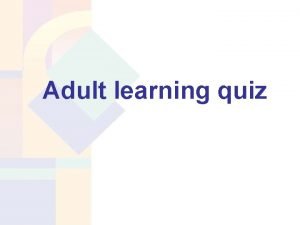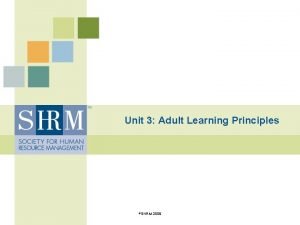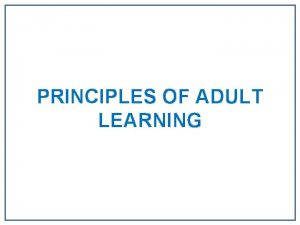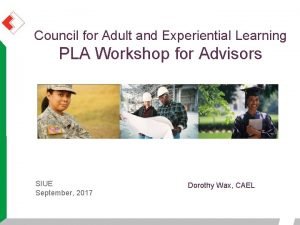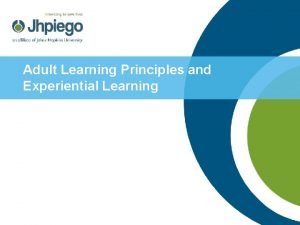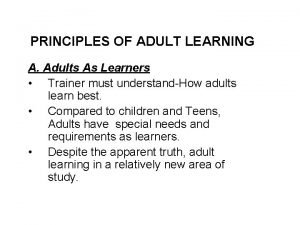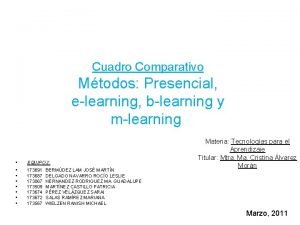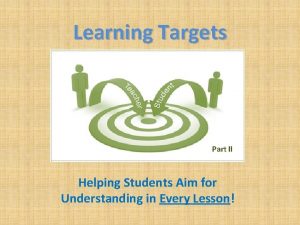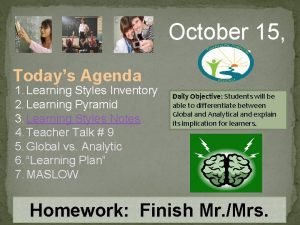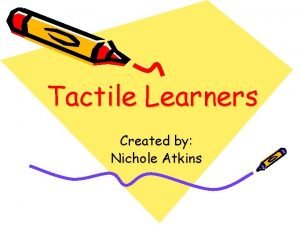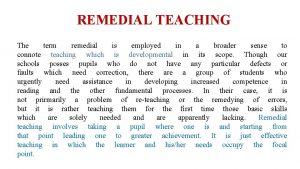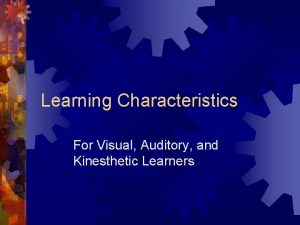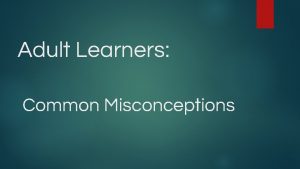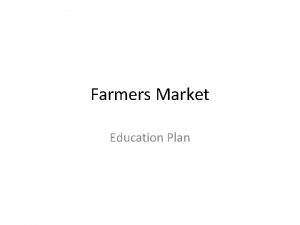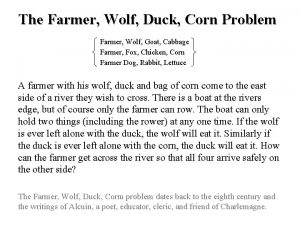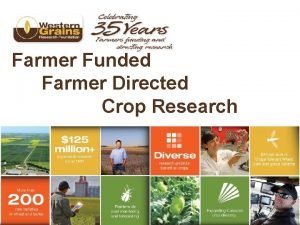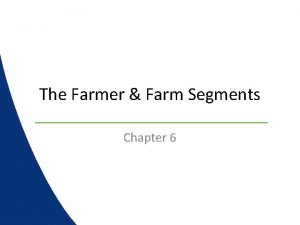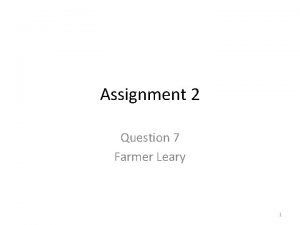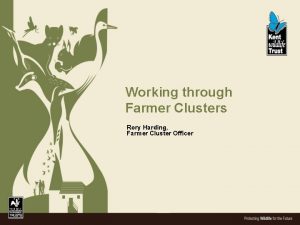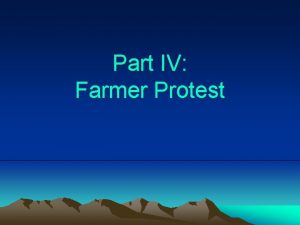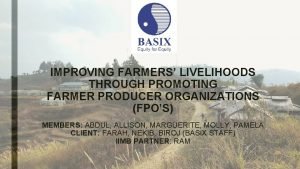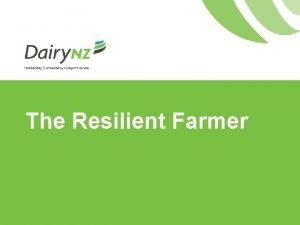Understanding Farmer Learning Farmers are adult learners not




















- Slides: 20

Understanding Farmer Learning • Farmers are adult learners not children • Farmers have different goals and interests • Farmers like to learn in different ways (eg reading, TV/radio, talking, seeing, doing) • Farmers like to learn from other farmers (eg relatives or friends or neighbours) • So extension needs to use multiple learning and teaching methods!!!

Adult Learning • Adults are self-directed not dependent. Involve them in designing their learning! • Adults have life experiences and knowledge. Acknowledge and use it. • Adults are goal-oriented. Set goals with farmers. • Adults need information to be relevant to their situation. • Adults are practical. Information needs to be applied to something. • Adults need to be shown respect.

Learning Cycle Do Plan Review

Learning Styles • • • See (learn from observation) Hear (learn from listening) Do (learn from doing) Talk (learn from discussion) Feeling (learning from success or failure) • Review (learn from reflecting)

Example – farmer group meeting • Hear from experienced farmer about growing shrimp • See the shrimp pond, feed, products etc • Catch some shrimps, do some measuring etc • Discuss the techniques- what to do, not to do • Discuss how farmers feel about growing shrimp • Reflect on meeting during follow up visit

How to facilitate effective learning 1. Know your farmers (goals, values, interests) 2. Plan learning activities together 3. Make it relevant!! 4. Provide a range of learning methods (tell, show, do, reflect) 5. Use the learning cycle with your farmers (plan, do, review)

Extension or Learning Methods • • Group meetings Farm or Pond walks Practical activities Farmer to farmer visits (cross visits) Using case studies (examples) Using CD/DVD Using posters or books






How to Facilitate Field Visits ü Appoint a facilitator (for process), information presenter (for content) and observer to take notes on process and content. ü Make introductions SHORT if possible ü Go to the field as farmers want to see ü Introduce the subject and ask farmer to talk about what they have done, the benefits and any problems ü Facilitate questions to host farmer

ü Try to include quiet people by asking their views or if they have any questions ü Stand next to talkative people. If they continue, gently ask them to listen and allow others to talk ü Allow farmers time to walk and look and discuss amongst themselves. ü Move from site to keep interest

ü Be aware when people are getting bored, tired or hungry ü Be flexible (don’t be afraid to change activity) ü Summarise content at the end of the day ü Have a farmer feedback session away from the site (what was most interesting, what else do they want to learn? ) ü Have a DAFO meeting to reflect on the day (+/ -) ü Enjoy yourself- if you are positive and happy then others will follow!

Facilitation Activity • Decide on type of field day- pig production? • List a variety of people who might attend a field day and staff roles • Nominate roles • Decide on program for the day • Develop range of scenarios that might happen to challenge facilitation • Do role play • Reflect on process and tips to improve

Why Evaluate Extension? Ø Have we been effective with farmer learning? Ø How can we improve our extension methods? Ø How can we help farmers gain more benefits? Ø How can we report to our managers? Ø How can we demonstrate our impacts?

How to Evaluate Extension • What do we want to know? • Write a list of the information you need (eg what did farmers learn? Were there any problems? what did staff learn? ) • Choose the best method for getting the information (eg observe, interview, survey, photo points, meeting) • Use the information to IMPROVE extension

Evaluation of Meat Market 1. How many sellers are there? 2. How many women and men sellers? 3. What type of meat/fish are they selling? 4. Where does the meat/fish come from? 5. How many head per day do they buy? 6. Do they buy direct from farmers or traders? 7. What is the range of prices? 8. How much profit do they make per day? 9. How many hours per day are they selling? 10. What do they think of the quality of product? Difference between upland lowland? 11. Other information from observation or photos?

Observe only Interview 2 Take sellers photos Pig meat 2 2 1 Cow/Buffalo meat 2 2 1 Fish 2 2 1 Chicken meat 2 2 1
 Mikael ferm
Mikael ferm Not genuine not true not valid
Not genuine not true not valid Adult learning pyramid
Adult learning pyramid 7 principles of adult learning
7 principles of adult learning For adult
For adult Council for adult and experiential learning
Council for adult and experiential learning Brookfield adult learning
Brookfield adult learning Adult learning principles
Adult learning principles Adult learning styles
Adult learning styles For adult
For adult Cuadro comparativo e-learning b-learning m-learning
Cuadro comparativo e-learning b-learning m-learning Trust in the lord song
Trust in the lord song Lean not on your own understanding
Lean not on your own understanding Learning target
Learning target All learning is understanding relationships
All learning is understanding relationships Global vs analytical learners
Global vs analytical learners Teaching grammar for young learners
Teaching grammar for young learners Tactile learner definition
Tactile learner definition Remedial teaching meaning
Remedial teaching meaning Global vs analytical learners
Global vs analytical learners Auditory learning characteristics
Auditory learning characteristics


